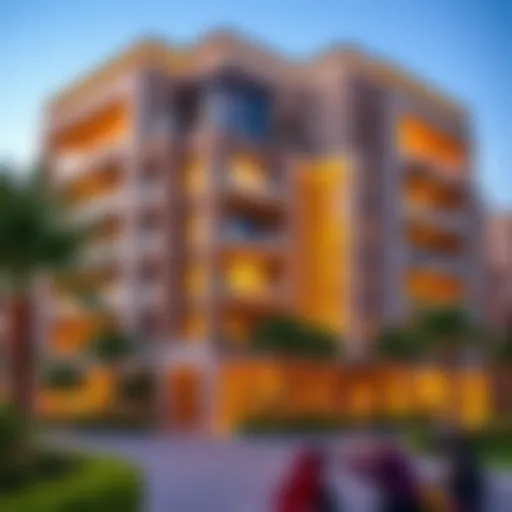Exploring Dubai's Real Estate Landscape: Key Insights


Intro
Navigating the vast expanse of Dubai's real estate can feel like charting a course through uncharted waters. With its ever-evolving landscape, understanding the geographical nuances of this vibrant city is essential for anyone considering property investment. As potential homeowners and investors set their sights on Dubai, it becomes crucial to grasp not only the market trends but also the intricate details that define each neighborhood within this urban oasis. Whether you are a seasoned investor or a first-time buyer, this guide aims to illuminate the path ahead.
In this exploration, we will delve into the flourishing market trends that currently define Dubai's property scene, highlighting the prevalent patterns as well as what lies ahead in the near future. Additionally, we will shed light on the various property types available, from residential havens to ambitious commercial spaces, marking both opportunities and hurdles distinct to Dubai's unique climate. The ultimate goal is to equip you with insights that enable informed decisions amid this dynamic landscape.
Let's embark on this journey, as we uncover the hidden gems and significant factors that will steer your investments in the right direction. The stakes are high, and the keys to success are hidden within the details.
Understanding the Dubai Real Estate Landscape
In the fast-paced world of real estate, understanding the underlying landscape of a market is crucial. This is especially true in Dubai, where the property market has undergone significant transformations in recent years. The intricacies of the Dubai real estate landscape can greatly influence investment decisions, making it imperative for investors, homebuyers, and agents alike to grasp the various elements at play.
Investing in real estate without a foundational understanding of the market's dynamics is akin to setting sail without a compass. Knowledge of the local landscape provides insights into property values, emerging trends, and neighborhood characteristics that are essential for making informed choices. This comprehensive understanding not only aids in identifying lucrative opportunities but also in navigating potential pitfalls in a market that is both vibrant and competitive.
Historical Context
Historically, the Dubai real estate market has been shaped by a mix of local and international influences. In the early 2000s, the emirate underwent rapid development, with the skyline transforming almost overnight. The hype of the property boom drew numerous investors eager to get a piece of the action. However, the market faced challenges, including fluctuations in property prices and regulatory changes aimed at stabilizing the sector.
To fully appreciate the present condition of the market, it's useful to look back at key milestones. From the introduction of freehold property ownership for expatriates in 2002 to the introduction of various initiatives aimed at boosting investment—like the Dubai Expo 2020—it’s clear that historical events have played a pivotal role in shaping the landscape. These developments have laid the groundwork for the current robust market environment.
Current Market Dynamics
Today, the dynamics of the Dubai real estate market reflect a landscape that is both complex and enticing. Factors like population growth, tourism influx, and government policies push the demand for housing upward. After experiencing a period of stabilization post-2014, the market is now signaling renewed enthusiasm.
Recent reports show that luxury properties are making a comeback, a clear indication of affluent investors re-entering the market. The rise in demand has led to innovative financing options and various incentives for buyers, making it an attractive proposition for both domestic and international stakeholders.
Furthermore, there’s a growing trend in sustainability, with many developments focusing on eco-friendly practices and energy efficiency. Neighborhoods that prioritize green spaces and sustainable architecture are becoming increasingly popular.
"Understanding the dynamics of the Dubai real estate market today is not just about numbers; it's about recognizing the stories and trends that dictate the direction of investment."
In summary, grasping the historical and current dynamics of Dubai’s real estate market allows investors and homebuyers to make more strategic decisions. Whether examining new developments or seasoned properties, this knowledge informs choices that can lead to meaningful returns and satisfied living experiences.
The Importance of Geographic Knowledge
Understanding the geographic landscape is crucial when navigating the Dubai real estate market. It’s not just about knowing what property is available, but rather understanding the nuances that come with the locations. Each neighborhood has its distinct personality and potential, influenced by factors such as demographics, access to amenities, and future developments. This knowledge empowers investors and homebuyers to make informed decisions, catering to their specific needs, whether they are looking for a family-friendly area, proximity to business hubs, or vibrant cultural scenes.
Moreover, geographic knowledge shapes one’s investment strategy. Investors can identify emerging opportunities in lesser-known neighborhoods that are on the brink of transformation. These insights can mean the difference between investing in a high-flying property that may face saturation or spotting a diamond in the rough that could yield substantial returns in the future. Understanding how different districts function together also aids in predicting trends, giving savvy investors a leg up on the competition.
Mapping the Opportunities
In Dubai, opportunities are often hidden within the map's folds. Each neighborhood might present distinct advantages waiting to be harnessed. For instance, areas like Al Barsha are experiencing modernizations that attract families and young professionals, while the waterfront appeal of Dubai Marina remains a perennial favorite among tourists and expatriates. Knowing which areas are trending today or likely to develop tomorrow is essential in capitalizing on market dynamics.
- Economic Hub: Areas like Downtown Dubai not only boast iconic landmarks but also host a bustling economy. The commercial opportunities here often drive property value upward.
- Balanced Living: In places such as Jumeirah Village Circle (JVC), the community design melds residential and commercial spaces, allowing for a more balanced lifestyle and elevating demand.
- Future Growth: Some suburbs are strategic locations for upcoming projects, promising more housing and infrastructure, which is a point to keep an eye on for potential growth in property value.
The act of mapping these opportunities invariably involves recognizing these patterns and correlations between geography, property values, and demographics. This granular understanding can significantly inform one’s investment strategies, leading to better-informed choices.
Neighborhood Insights
Delving deeper into specific neighborhoods uncovers the rich tapestry that makes Dubai unique. Each area possesses its own set of characteristics that can influence property dynamics. For example:
- Dubai Marina: Famed for its skyline and vibrant lifestyle, the Marina attracts a diverse demographic. It's a prime spot for short-term rentals, making it lucrative for investors.
- Palm Jumeirah: This epic landmark offers luxury properties with premium prices. However, the rent-to-price ratio typically attracts high-net-worth individuals and vacationers, forming a steady demand.
- Dubai Hills Estate: As a newer development, it features a cleverly integrated residential and leisure living environment, appealing to families looking for more green spaces and community-oriented living.
Understanding these unique characteristics allows investors and homebuyers to align their priorities with what each neighborhood offers. Recognizing the vibe, the emerging populace, and the proximity to key amenities can make choosing a location less of a gamble and more of a calculated decision.
"Location isn’t just a logistics choice; it’s the fabric of community life and investment potential."
Navigating the Dubai real estate landscape without this geographical knowledge would be like sailing without a compass. Engaging with the local environment equips buyers with the insights they need to position themselves advantageously in a competitive market.
Key Areas to Consider
When diving into the Dubai real estate market, understanding the key areas is paramount. The city is a vibrant tapestry of neighborhoods, each with its own unique character, cultural influences, and investment potential. Selecting the right area can greatly influence your return on investment and overall satisfaction if you’re buying a home. Not all neighborhoods are created equal and nuances between them can have significant implications for both residential and commercial properties.
- Strategic Positioning: Some areas are central and provide stellar access to amenities and business districts. Others offer serene environments ideal for families. Understanding geographic dynamics can help set you on the right path.
- Potential Growth: Various neighborhoods show promising growth trends. Keeping an ear to the ground about emerging areas can yield significant long-term gains.
- Lifestyle Compatibility: Consider what type of lifestyle you aspire to pursue. Vibrant urban living or tranquil suburban settings? Different areas cater to different preferences, making the choice personal yet critical.
Downtown Dubai
Downtown Dubai is often dubbed the pulsating heart of the city. Home to the world-famous Burj Khalifa and the Dubai Mall, this area attracts tourists and expatriates alike. The blend of modern architecture and lifestyle amenities makes it a hotbed for investors looking for high returns.
The appealing factors include:
- High rental yields, often above 7%.
- Top-notch amenities, from luxury dining to sprawling parks.
- Proximity to global business hubs, making it convenient for professionals.


However, competition can be stiff, and prices are on the higher end, which may pose a challenge for first-time buyers.
Dubai Marina
Dubai Marina is a mesmerizing waterfront community, encapsulating a luxurious lifestyle that many dream about. The area boasts stunning high-rises and a charming promenade allowing for leisurely walks by the marina.
Key attributes worth noting include:
- Diverse Property Options: Ranging from opulent villas to trendy apartments, there’s a little something for everyone.
- Vibrant Nightlife: The area is teeming with restaurants, bars, and cafes, drawing in a mix of locals and expats.
- Attractive for Long-term Rentals: Thanks to scenic views and lifestyle perks, rental demand remains high.
Palm Jumeirah
Iconic and instantly recognizable, Palm Jumeirah is quite literally a showpiece of Dubai's ambition. This palm-shaped island is not just about looks; it offers luxurious living and unparalleled amenities.
Consider the following factors:
- Luxury Focus: Property prices are among the highest in the emirate, but the lavish lifestyle is undeniable.
- Exclusive Beach Access: Residents enjoy private beaches and high-end resorts.
- Celebrity Appeal: The area attracts affluent buyers and renters, adding to its appealing charm.
While it may not be the most affordable option, it provides experiences that are unmatched in the Dubai market.
Jumeirah Village Circle (JVC)
Jumeirah Village Circle presents a contrasting picture. This family-friendly community is characterized by its more affordable housing options and is increasingly popular among young families and professionals.
Key details include:
- Affordability: Prices are relatively lower compared to more established areas, offering a good entry-point for investors and homebuyers.
- Community Feel: Enclosed parks, schools, and community amenities promote a vibrant neighborhood vibe.
- Growth Potential: As infrastructure develops, property values are expected to rise, making it a smart investment choice.
Dubai Hills Estate
Dubai Hills Estate represents a luxurious suburban lifestyle imbued with greenery and open spaces. This area caters largely to families and outdoor lovers.
Highlights of this area include:
- Planned Community: The area is carefully designed with parks, walking trails, and cycling paths, promoting an active lifestyle.
- Modern Living: Properties here are characterized by contemporary designs with quality finishes.
- Strategic Location: Its position offers easy access to major road networks and is conveniently located near central business districts.
As the city expands, areas like Dubai Hills Estate are likely to see sustained interest, especially as golf courses and retail options mature.
By taking a closer look at these key areas, investors and homebuyers can make more astute decisions that align not only with financial goals but lifestyle aspirations as well. In the fast-paced realm of Dubai’s real estate, knowledge is indeed power.
Real Estate Market Trends
Understanding the trends in the real estate market is essential for anyone looking to navigate Dubai's vibrant property sector. With a market that fluctuates significantly due to various socio-economic factors, recognizing these trends offers investors, homeowners, and agents the ability to make informed decisions. This section delves into the nuances of price fluctuations, rental market dynamics, and emerging segments that define the current landscape.
Price Fluctuations
Price fluctuations in the Dubai real estate market are a direct response to several influencing factors, such as demand, supply, and international economic conditions. The prices can soar or plummet with the faintest hint of changes in market sentiment. For instance, during global economic downturns, buyers may hesitate, causing property prices to dip.
Investors must keep an eye on price trends across different neighborhoods, as what works in Downtown Dubai might not hold true for areas like Dubai Marina or Palm Jumeirah. Additionally, it’s also crucial to note how external factors, like living cost adjustments and interest rates, play a pivotal role in price stabilization or volatility.
Many buyers and investors often rely on historical data analyzed through various reports. This helps them understand not just where the market has been, but where it is likely headed.
"Analyzing price fluctuations isn't just about numbers; it's about predicting the pulse of the market."
Rental Market Insights
The rental market in Dubai reflects the city's robust tourism and expatriate population, which continuously fuels a diverse demand for rental properties. According to recent reports, areas with proximity to key business districts and leisure amenities tend to have higher rental rates. For example, properties located in Dubai Marina command premium prices due to their stunning views and vibrant lifestyle.
On the flip side, emerging neighborhoods like Jumeirah Village Circle (JVC) often present more affordable options for budget-conscious renters. The rental yield in these areas is gradually becoming attractive for investors looking for long-term income.
Given the varying demand for rentals, it is essential for potential tenants and landlords to be familiar with the fluctuating rental rates, lease lengths, and tenant demographics. This not only helps in optimizing rental returns but also fosters positive landlord-tenant relationships.
Emerging Market Segments
As Dubai continues to evolve, several market segments are gaining prominence. Luxury properties, especially in areas like Palm Jumeirah, are seeing a surge in demand from affluent buyers seeking vacation homes or investment opportunities. On the other end of the spectrum, affordable housing projects are emerging as key players in line with the Government's vision to accommodate diverse demographics.
The concept of co-living is also making its mark, appealing particularly to millennials and digital nomads who seek shared spaces with community vibes. This evolution reflects a broader global trend where lifestyle preferences dictate property choices.
Investors should remain vigilant to these emerging trends to adapt their strategies accordingly. Keeping an ear to the ground on urban development initiatives and shifts in consumer behaviors can provide a competitive edge in navigating the Dubai real estate market.
In summary, recognizing these real estate market trends is vital for making informed choices, whether it be for investment or renting. The interplay of price fluctuations, rental insights, and the emergence of new segments shapes the future of the Dubai real estate scene.


Financing Options for Investors
In the world of Dubai real estate, comprehension of financing options can feel like navigating a maze. For investors, understanding these avenues isn’t just useful; it's essential. Financing options can make or break an investment decision, influencing cash flow, profitability, and overall investment viability. In particular, the built environment in Dubai presents some unique opportunities and considerations worthy of attention for ppotential investors.
Mortgage Options
When it comes to mortgages in Dubai, the landscape offers various financing choices tailored to different situations. Whether you're looking to buy an apartment in Downtown or a villa in Palm Jumeirah, knowing your options feels like arming yourself with a treasure map.
Some key mortgage options include:
- Fixed-Rate Mortgages: These loans often feature predictable monthly payments, which can help with budgeting. However, the interest rate remains constant, which might not be favorable if rates go down in the market later.
- Variable-Rate Mortgages: These can fluctuate based on changes in interest rates, potentially offering lower initial payments but also greater risk over time. Investors need to accurately assess their risk tolerance in this context.
- Islamic Mortgages: In the UAE, particularly significant for Sharia-compliant investments, these adhere to Islamic finance principles. While typical mortgages might face some restrictions, these options can lead to favorable conditions for some investors.
Moreover, when considering mortgages, it's crucial to factor in the down payment. In Dubai, especially for non-residents, down payments can range from 20% to 50% of the property price. This can place a sizeable cash burden on investors. Be it buying a studio or a luxurious apartment, preparing a realistic budget ahead of time pays dividends.
Investment Financing Strategies
Investment strategies are like the flying carpets of the property world—they allow you to glide over obstacles and reach your financial destination more smoothly. In the vibrancy of Dubai's property market, utilizing effective financing strategies is paramount.
Some viable investment financing strategies include:
- Leveraging Equity: For current property owners, tapping into equity from established properties can provide the necessary funds for new investments. This might involve refinancing existing mortgages.
- Partnerships: Joining forces with another investor can diversify the capital and share risks. Collaborative approaches can foster pooling resources for larger-scale investments, potentially leading to bigger profits.
- Invest in Property Funds: For those wary of direct ownership, Real Estate Investment Trusts (REITs) or property funds emerge as a more passive strategy. Through these avenues, investors can participate in the market with lower entry amounts.
- Crowdfunding Platforms: An emerging trend in Dubai, crowdfunding allows multiple smaller investors to pool their money for a shared property. It's a way for newcomers to enter the market without hefty financial commitments.
Each financing strategy comes with its own set of risks and returns, making it imperative for investors to analyze and choose wisely.
"Investing without research is like taking a stroll in the desert without water—risky and potentially disastrous."
Understanding these facets of financing can significantly influence the ROI you can expect. Throwing yourself into the world of Dubai property without the right financial backing isn’t just unwise; it could lead to dire consequences. For anyone looking to step into the fast-paced arena of Dubai real estate, aligning your financial framework with your investment strategy creates a solid foundation for success.
Legal Considerations in Real Estate
Understanding the legal landscape in Dubai’s real estate market is crucial for anyone aiming to invest in or navigate this vibrant sector. The laws and regulations governing property ownership, investment, and transactions are designed not only to protect buyers and sellers but also to instill confidence in the market. Ignorance of these legal frameworks can lead to costly mistakes, or worse, loss of property. Thus, a clear grasp of legal stipulations ensures that buyers can make informed decisions, minimizing risk and maximizing opportunity.
Property Ownership Laws
In Dubai, the laws regarding property ownership can differ significantly based on the type of property and the buyer's nationality. Before diving headfirst into the market, it’s essential to understand these nuances:
- Freehold vs Leasehold: Foreigners are permitted to purchase freehold properties in designated areas, allowing complete ownership. Areas such as Dubai Marina and Downtown Dubai are prime examples of these freehold zones. Meanwhile, leasehold properties, which are owned for a set period (commonly 99 years), have restrictions on ownership by non-nationals.
- Property Registration: Registration of property is mandatory in Dubai. This process is facilitated by the Land Department, ensuring that all transactions are recorded, and ownership is legally recognized. It's advisable to engage a trusted real estate agent or legal advisor during this phase to avoid any missteps.
- Buying Off-Plan Properties: If you are considering buying an off-plan property, be sure to review the Dubai Real Estate Regulatory Authority’s guidelines. These include checks on developer credibility and adherence to project timelines. The laws stipulate that buyers can rescind contracts under certain circumstances if the project fails to meet set standards.
Understanding these core elements is just the start; there are many underlying rules and requirements that could affect your investment. A local lawyer with experience in real estate can significantly help in navigating potential pitfalls.
Regulations for Foreign Investors
When it comes to foreign investors, Dubai has cultivated an environment that welcomes investment while ensuring that regulations safeguard the local economy and international participants:
- Investment Laws: As of recent years, foreign nationals can own up to 100% of their business interests in the UAE, thanks to changes in law that allow for complete foreign ownership in many sectors. Real estate is one sector where this applies, enhancing Dubai’s appeal as a prime investment destination.
- Residency and Visas: Acquiring property in Dubai can also open doors to residency options. Investing in property valued above a certain threshold can grant residency benefits, making it attractive for expatriates. However, conditions for maintaining residency may vary and should be comprehended thoroughly.
- Tax Considerations: The UAE has a favorable tax regime – you won't find personal income taxes here. But, there are some property-related fees and taxes to consider, such as registration fees, maintenance costs, and potential capital gains taxes. Engaging an accountant familiar with local laws can provide financial clarity.
In short, understanding legal considerations not only protects your investment but also positions you for success in Dubai's dynamic real estate market. To deepen your understanding, further resources and guidelines can be explored at Dubai Land Department and Dubai Economic Department.
"A solid comprehension of legal frameworks is akin to having a sturdy compass when navigating the intricate waters of real estate investment."
Prospective Developments
Understanding prospective developments within the Dubai real estate market is not just a peek into the future; it’s a gauge of economic vigor and a compass for investors looking to navigate their next big opportunity. In a city renowned for its projects that seem to pierce the sky, the potential for growth and transformation remains boundless. This section probes into emerging projects and sustainability initiatives, shedding light on how they shape the real estate landscape.
Future Projects
As we look ahead, it’s clear that Dubai is a melting pot of innovative projects that reflect both local culture and global trends. The government often spearheads these initiatives, emphasizing economic diversification and enhancing the city’s global appeal.
For instance, the Dubai Creek Tower is projected to be the tallest structure on the planet. The tower, part of the larger Dubai Creek Harbour development, is designed to be a vibrant hub that integrates residential, commercial, and leisure spaces. Such projects not only redefine the city skyline but also open doors for a variety of investment opportunities.
Moreover, the upcoming Dubai World Central aims to be a game changer, hosting both the new Al Maktoum International Airport and expansive residential and commercial properties. This area is strategically pivotal; essentially, it’s a new city rising from the desert, catering to the anticipated influx of tourists and businesses.
Investors may find that keeping tabs on these developments can uncover the most lucrative prospects. Existing properties in nearby neighborhoods may see value appreciation as infrastructure improves, attracting foreign investors and enhancing rental yields.
Sustainability Trends
Sustainability is not just a buzzword in Dubai; it’s becoming the cornerstone of urban development. With a significant focus on green building practices and eco-friendly projects, the city aims to position itself as a leader in sustainable urban living. The Dubai Sustainable City is an embodiment of this trend, showcasing solar-powered homes and communal gardens designed for sustainable living.
Investors looking to align with global sustainability efforts will find opportunities abundant in sectors that focus on green technologies. Furthermore, developments like Expo 2020's site are transitioning into long-term residential and commercial use, incorporating sustainability features like energy-efficient systems and innovative waste management.
Enhancements also reach into the regulatory framework with the Dubai Green Building Code, encouraging builders to adhere to environmental standards. This not only protects the ecosystem but also caters to an increasingly eco-conscious market, making properties that meet these criteria more attractive.


"The trends in sustainability within Dubai's real estate market signify a shift towards not only luxury but responsibility; a step forward for both investors and the environment."
Navigating the Property Market Online
Living in a digital world, embarking on a real estate journey without online resources is like trying to find a needle in a haystack. The internet has morphed into an indispensable tool for potential property buyers and investors, cutting down time while making the search more manageable. Here, we'll break down how one can effectively navigate this online landscape, specifically focusing on the importance and utility of online listings and the crucial role that real estate agents play in this modern approach.
Utilizing Online Listings
The world of online listings opens up a treasure trove of opportunities. Websites like Bayut and Property Finder serve as a bustling marketplace where buyers can peruse myriad options right from the comfort of their living rooms. These platforms allow users to filter properties based on various criteria such as location, price range, and type of property, thus providing a personalized search experience.
Some key benefits of utilizing online listings include:
- Diverse Options: An incredible variety of listings can be explored, enabling users to discover hidden gems that might not be visible through traditional channels.
- Instant Updates: Many real estate platforms offer alerts and notifications, keeping you informed about new listings or significant price changes.
- Rich Content: You’ll often find detailed descriptions, high-resolution images, and virtual tour options, effectively bringing the property to life before you even step foot inside.
However, one needs to exercise caution. Not every listing is created equal; therefore, one should always verify the authenticity of the listings and cross-reference with real estate firms or agents to avoid potential pitfalls. As the saying goes, “Better safe than sorry.” Investing time to confirm details can save considerable heartache down the line.
The Role of Real Estate Agents
In an environment often characterized by overwhelming choices, real estate agents are like navigators on a ship steering you through the complex waters of property buying. They bring expertise, local market insights, and negotiation skills, turning a daunting process into a smoother sail.
Here’s how agents add value during your online property hunt:
- Access to Off-Market Listings: Agents often have access to exclusive properties that aren’t typically listed online. This can give you a competitive edge.
- Negotiation Tactics: An experienced agent knows how to advocate for you, potentially saving you significant money through strategic negotiation.
- Market Trends: With their fingertip on the pulse of market dynamics, they can provide instant insights that might not be apparent through online listings alone.
- Paperwork and Legal Guidance: Navigating the legalese can be overwhelming; a skilled agent ensures that all paperwork is appropriately handled, making the process less stressful.
Given the rapidly evolving landscape of real estate in Dubai, partnering with a knowledgeable agent can be the difference between a regrettable purchase and a wise investment. As you venture into this online territory, remember the words of wisdom, "Two heads are better than one.”
Investment Strategy Development
Investment strategies in Dubai’s real estate market play a crucial role in determining the success of property investments. With a rapidly evolving landscape, the importance of a well-formulated plan cannot be overstated. Strategies not only guide investors on where and when to invest but also help in aligning investments with long-term financial goals. Understanding the local market dynamics is essential to frame a strategy that maximizes potential returns.
When developing an investment strategy, several elements must be taken into account:
- Market Conditions: Investors should keep a vigilant eye on current market trends, such as price fluctuations or the demand for rental properties. This insight can help in anticipating changes.
- Property Type Selection: Knowing which types of properties yield the best returns is vital. For instance, residential properties may have steady demand, while commercial properties can offer higher rewards.
- Geographic Focus: The diverse neighborhoods of Dubai require tailored strategies. Downtown may attract a different kind of buyer than Dubai Marina or Jumeirah Village Circle.
Identifying Investment Goals
Setting clear investment goals is the cornerstone of any successful strategy. Understanding what one wants to achieve allows for more focused decision-making. Investor objectives might include:
- Capital Appreciation: Aiming for increased property value over time.
- Cash Flow: Investing in properties that provide consistent rental income.
- Diversification: Spreading investments across different areas to mitigate risks.
When identifying goals, investors should assess their financial capacity, timeline for returns, and risk tolerance. This self-reflection is essential, as it brings clarity to the type of properties one should target. \nA common pitfall is failing to align goals with market realities, leading to misguided investments.
Analyzing Risks and Returns
Every investment comes with inherent risks, and real estate is no exception. Analyzing these risks against potential returns is crucial.
Some common risks in Dubai real estate include:
- Market Volatility: Sudden price shifts can affect investments.
- Legal Issues: Understanding local regulations and ownership laws is crucial; missteps can be costly.
- Financing Challenges: Shifts in interest rates can impact mortgage rates, affecting cash flow.
On the other hand, potential returns can be enticing. For instance, areas undergoing significant development might see properties appreciate rapidly. However, it’s crucial to assess the risk-reward balance. Investing in a burgeoning neighborhood could yield high returns, but accompanying risks need to be evaluated.
"Understanding risk and return in real estate isn't just about profit; it’s about making informed decisions that fit your goals."
Ending and Future Outlook
Navigating the nuances of Dubai's real estate landscape requires a comprehensive understanding of both the current market conditions and future forecasts. This article has dissected the critical aspects of Dubai's property market, emphasising the significant role of geography in investment decisions. The insights gleaned here shape an investor's approach and illustrate the myriad opportunities that this ever-evolving sector presents.
As we conclude, it’s crucial to acknowledge that the Dubai real estate sector is driven by a variety of factors—economic trends, global investor interest, and even local development initiatives. The region continues to attract foreign investment not just because of its luxurious properties but also its strategic positioning. Owning property here is not merely a transaction; it is a stake in a growing, vibrant urban ecosystem.
Summary of Key Insights
In summary, the key takeaways from our exploration include:
- The historical evolution of Dubai real estate provides context to current market trends, showing a resilient growth trajectory despite global shifts.
- Neighborhoods like Downtown Dubai and Dubai Marina remain hot spots for property investment, balancing lifestyle with financial return potential.
- Understanding the various financing options available is pivotal, as they often dictate the feasibility of investment decisions for both seasoned investors and first-time buyers.
- Awareness of legal considerations, especially for foreign investors, is fundamental in navigating the purchase process effectively.
- Future developments point towards a sustainability-focused approach, setting the stage for innovative projects that will further reshape the skyline.
These insights underscore the blend of geographical factors, economic indicators, and personal goals that together chart the course for successful real estate investment in Dubai.
Looking Ahead in Dubai's Real Estate
As we look to the horizon of Dubai’s real estate market, it becomes evident that the future holds substantial promise. The city is not resting on its laurels; rather, it is continually redefining itself to meet emerging trends and expectations. Current governmental initiatives aim to boost investor confidence and refine regulations which can only enhance the market's attractiveness.
Moreover, with new technologies emerging, such as virtual reality property walkthroughs, buyers can have an enriched experience of viewing properties remotely. This can streamline the buying process, making it both efficient and user-friendly.
Additionally, demographic shifts and changing consumer preferences will affect demand dynamics. Millennial and Gen Z buyers are increasingly prioritizing sustainability, tech integration, and community living, prompting developers to adjust their offerings accordingly. Investing in properties that align with these values could yield significant long-term benefits.
It’s important for those considering entry into Dubai’s real estate market to stay attuned to these evolving trends, while also leveraging the wealth of data and resources available. Engaging with trusted real estate partners and using platforms like Dubai Land Department or Property Finder can offer valuable insights that enhance the decision-making process.
In closing, a well-rounded approach to understanding both the foundational elements of the market and future possibilities will ultimately empower investors to navigate the intricacies of Dubai's real estate effectively.















